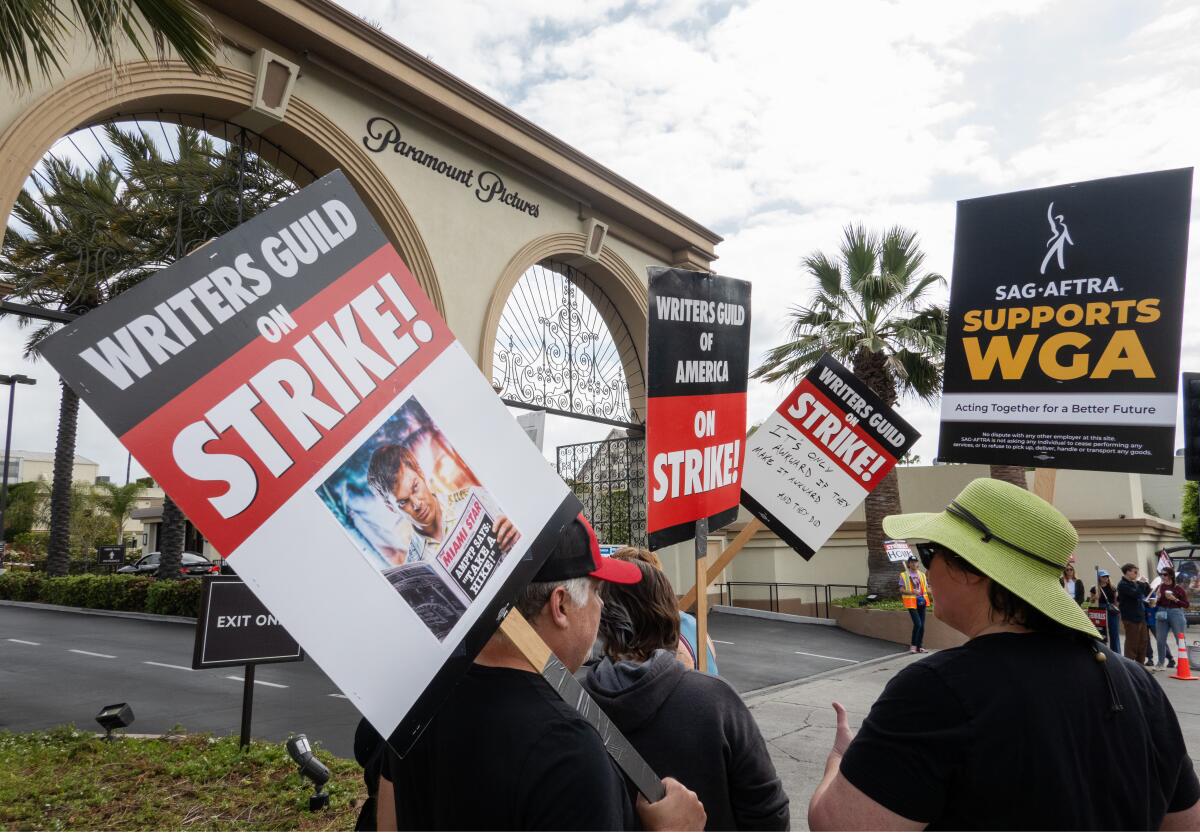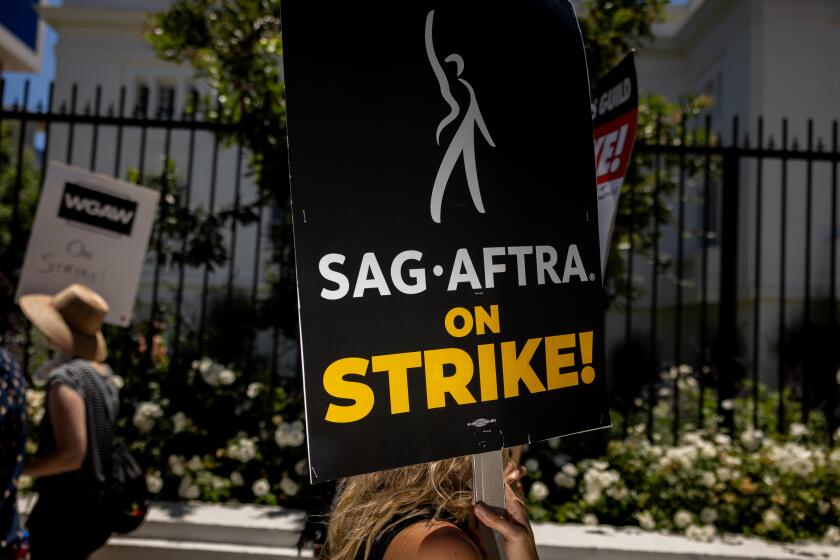On the brink of a possible SAG-AFTRA strike, some actors are wary of AI. Here’s why.

- Share via
With film and television actors potentially joining screenwriters by going on strike as soon as their union’s contract expires Wednesday at 11:59 p.m., debates about Hollywood’s future are escalating quickly.
Figuring prominently in those debates is the rise of artificial intelligence, a technology that the Writers Guild of America and SAG-AFTRA — the actors’ union — say is cause for concern.
AI is rapidly becoming a bigger part of the economy, from virtual girlfriends to auto-generated job applications, but the technology’s relationship with Tinseltown is proving particularly fraught, given its ability to generate content. (The quality of the resulting material is up for debate.) The roll-out of this “generative AI” could make workers’ jobs easier — or put them out of work entirely.
What’s more, Hollywood is where many consumers will first encounter AI. The software has already found its way into popular media, including the title sequence of the recent Disney+ show “Secret Invasion” and the de-aged Harrison Ford who appears via flashback in the new “Indiana Jones and the Dial of Destiny.”
The new labor contracts that emerge from these labor negotiations will determine what the future of show business looks like — and how much of that future takes place inside a microchip rather than a writers room or studio backlot.
Why are actors worried about AI?
Artificial intelligence was a recurring talking point for SAG-AFTRA as it prepared to enter negotiations with the Hollywood studios.
The union has focused on the computerized simulation of actors — that is, using AI to re-create an actor digitally, allowing studios to create performances on screen that the actor never actually gave.
SAG has called for the new contract to include terms regulating when AI can be used (and for how much money) as well as protections against misuse.
In an editorial for Variety, the union’s chief negotiator, Duncan Crabtree-Ireland, emphasized that SAG-AFTRA isn’t trying to ban AI from Hollywood but said that “acquiring rights to train an AI system with a performer’s voice and likeness, or using an AI system to create new performances using a performer’s voice and likeness, must be bargained with the union.”
The prospect of an actors’ walkout comes amid a broader labor conflagration in the entertainment industry. Writers went on strike May 2, grinding scripted TV productions to a halt. While the WGA’s primary concerns were over issues including streaming pay, writers have also expressed major worries about their work being displaced by AI-generated scripts and story outlines that they might be asked to punch up.
“The challenges that are coming from [labor groups] is whether or not these technologies could really either replace or at least displace a lot of this human labor,” said David Gunkel, a professor of media studies at Northern Illinois University and the author of “The Machine Question: Critical Perspectives on AI, Robots and Ethics.”
As AI becomes increasingly prominent, actors could find themselves with less legal protection than writers, Gunkel added, given that the frameworks around copyrighting written works are more extensive than those around actors licensing out their likenesses.
SAG-AFTRA has approved a deal from the studios to end its historic strike. The actors were on strike for more than 100 days.
Where do the studios stand?
The Alliance of Motion Picture and Television Producers, which represents the Hollywood studios in negotiations with both the writers and the actors, has said AI “raises hard, important creative and legal questions.”
In a document circulated in May, the organization wrote: “Writers want to be able to use this technology as part of their creative process, without changing how credits are determined, which is complicated given AI material can’t be copyrighted.”
Both SAG-AFTRA and the AMPTP are now under a media blackout. The former didn’t respond to a request for comment on this story, and the latter declined to comment.
However, it’s clear that studios want to be able to stay on top of this rapidly developing technology, which could let them streamline certain processes and possibly save money.
How could ‘generative AI’ change Hollywood?
Artificial intelligence, or AI, refers to a broad field of technology aimed at replicating different aspects of human cognition through software. The AI being developed nowadays tends to work by absorbing enormous quantities of data and then inferring patterns, allowing it to create seemingly novel content itself.
This is often called generative AI. It’s impressive but has limits in creative fields.
“It can go from one point to another, but it’s not gonna invent impressionism,” said Philippe Esling, an associate professor in machine learning applied to music at Sorbonne Université in Paris. “Those major changes — creative, artistic changes — are still kind of out of reach.”
In the last year, free and consumer-friendly AI modules have become widely available, including the ChatGPT text generator and the DALL-E image-maker. These and other programs are able to take in a user’s prompt and then, drawing from the data they were trained on, return something new.
According to the market research firm PitchBook, global investment in AI rose quarter-over-quarter to $22.7 billion in the first quarter of this year, including Microsoft’s blockbuster $10 billion investment in the research group OpenAI.
There are already a host of companies aiming to introduce AI into the worlds of film and television.
Some focus on creating synthetic audio or video that can replace actors on screen, such as for stunt work, last-minute dialogue changes or digitally de-aged performers. Others have emphasized changes to the Hollywood workflow, such as automatically visualizing a film script before shooting it or overlaying CGI characters atop a motion-capture performance.
The president of OpenAI recently pitched the technology as a way to rewrite the widely-criticized “Game of Thrones” finale.
But industry stakeholders are split on the extent to which this technology could meaningfully replace human labor.
“There are instances where AI should be regulated in filmmaking, but I think it’s crucial we consider exactly how it is being used in each instance,” said Tye Sheridan, a SAG-AFTRA member who starred in “Ready Player One” and founded the CGI-focused AI startup Wonder Dynamics.
“I’m not sure anyone wants to live in a world where actors sit at home and license their likenesses to studios,” Sheridan added in an email. “I know I wouldn’t because it would take all of the joy out of my craft. On the flip side, there are aspects of filmmaking that are cumbersome, expensive and time-consuming, and I’m optimistic about AI that alleviates those burdens and helps to support us in the creative process.”
More to Read
Inside the business of entertainment
The Wide Shot brings you news, analysis and insights on everything from streaming wars to production — and what it all means for the future.
You may occasionally receive promotional content from the Los Angeles Times.












